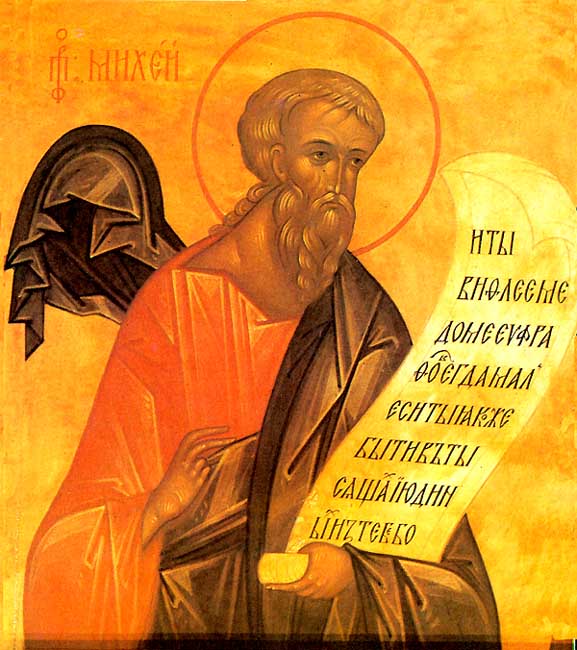The Holy Prophet Micah.
 Micah was of the tribe of Judah and
from the village of Morasth for which he is called the "Morasthite."
He was a contemporary of the prophets Isaiah, Amos, Hosea and the
Jewish kings Jotham, Ahaz and Hezekiah. Micah rebuked the vices of
his people and rebuked the false prophets who prophesied "of
wine and of strong drink" (Micah 2:11). He foretold the
destruction of Samaria. He also foretold the destruction of
Jerusalem, which will come because their leaders accept bribes, the
priests teach for lucre and its prophets tell fortunes for money.
"Therefore shall Zion for your sake be plowed as a field and
Jerusalem shall become as heaps" (Micah 3:12). But, of all his
prophecies, the most important prophecy is that of the Messiah,
especially the place of His birth. He mentioned Bethlehem as the
birthplace of the Messiah, "Whose goings forth have been from of
old, from everlasting" (Micah 5:2). It is not known exactly
whether this prophet was slain by the Jews or whether he died a
peaceful death. "Micah the Morasthite prophesied in the days of
Hezekiah king of Judah and spoke to all the people of Judah saying,
Thus said the Lord of hosts; Zion shall be plowed like a field and
Jerusalem shall become heaps and the mountain of the house as the
high places of a forest. Did Hezekiah king of Judah and all Judah put
him at all to death? Did he not fear the Lord and besought the Lord
and the Lord repented him of the evil which he had pronounced against
them? Thus might we procure great evil against our souls"
(Jeremiah 26:18-19). However, it is known that he was buried in his
village and his relics were found, together with the relics of the
Prophet Habakkuk, during the reign of Emperor Theodosius the Great
according to a mysterious revelation, which Bishop Zevin of
Eleutheropolis received.
Micah was of the tribe of Judah and
from the village of Morasth for which he is called the "Morasthite."
He was a contemporary of the prophets Isaiah, Amos, Hosea and the
Jewish kings Jotham, Ahaz and Hezekiah. Micah rebuked the vices of
his people and rebuked the false prophets who prophesied "of
wine and of strong drink" (Micah 2:11). He foretold the
destruction of Samaria. He also foretold the destruction of
Jerusalem, which will come because their leaders accept bribes, the
priests teach for lucre and its prophets tell fortunes for money.
"Therefore shall Zion for your sake be plowed as a field and
Jerusalem shall become as heaps" (Micah 3:12). But, of all his
prophecies, the most important prophecy is that of the Messiah,
especially the place of His birth. He mentioned Bethlehem as the
birthplace of the Messiah, "Whose goings forth have been from of
old, from everlasting" (Micah 5:2). It is not known exactly
whether this prophet was slain by the Jews or whether he died a
peaceful death. "Micah the Morasthite prophesied in the days of
Hezekiah king of Judah and spoke to all the people of Judah saying,
Thus said the Lord of hosts; Zion shall be plowed like a field and
Jerusalem shall become heaps and the mountain of the house as the
high places of a forest. Did Hezekiah king of Judah and all Judah put
him at all to death? Did he not fear the Lord and besought the Lord
and the Lord repented him of the evil which he had pronounced against
them? Thus might we procure great evil against our souls"
(Jeremiah 26:18-19). However, it is known that he was buried in his
village and his relics were found, together with the relics of the
Prophet Habakkuk, during the reign of Emperor Theodosius the Great
according to a mysterious revelation, which Bishop Zevin of
Eleutheropolis received.Translation of the Relics of our Father Theodosius, Hegumen of the Pecherskaja Lavra.
Respectfully Taken From the:
"The Prologue of Ohrid"
by St. Nikolai of Zica, Serbia(Velimirovic)
No comments:
Post a Comment